We all know that music education is an extremely important part of any child’s education, otherwise why we would we teach it every day! But how do you continue to demonstrate it to the community, your school administration staff and parents
The answer is advocacy! And in a time of budget cuts, and less money being made available, advocacy has never been more important!
If music teachers are armed with a swag of researched advocacy and reasons why music is so important, then they are always equipped to answer any question when it comes up. Answers are always stronger if they’re backed up with research, so we’ve included links to all the quotes and facts below so you can always find out more.
Check out these important Research Papers
| “The Power Of Music : its impact on the intellectual, social and personal development of children and young people”
“In early childhood there seem to be benefits for the development of perceptual skills which effect learning language subsequently impacting on literacy which is also enhanced by opportunities to develop rhythmic co-ordination. Fine motor co-ordination is improved through learning to play an instrument. Music also seems to improve spatial reasoning, one aspect of general intelligence which is related to some of the skills required in mathematics. While general attainment is clearly affected by literacy and numeracy skills, motivation which depends on self-esteem, self-efficacy and aspirations is also important in the amount of effort given to studying…. Group music making is also beneficial to the development of social skills and can contribute to health and well-being throughout the lifespan and can therefore contribute to community cohesion providing benefits to society as a whole.” Professor Sue Hallam |
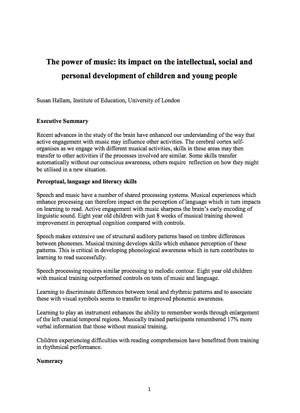 |
| “Music, Language, and the Brain” “Music and language define us as human. These traits appear in every human society, no matter what other aspects of culture are absent.” Aniruddh D. Patel, |
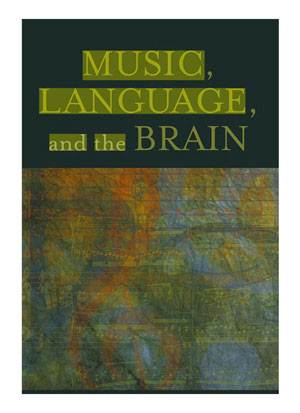 |
| “Music and Science : Three Views”
“It (Music) may have contributed to the emergence of one of our most distinguishing features, our cognitive flexibility. In other words, through an application of science to music it becomes possible to make the claim that it is only through music that we have become human. Thus [it can] be argued that “music” as an identifiable human pursuit… as a distinct and socially-conditioned activity in the particular processes of human evolution that gave rise to Homo sapiens sapiens, our own species. It may be that music is the most important thing that we humans ever did.” Professor Ian Cross |
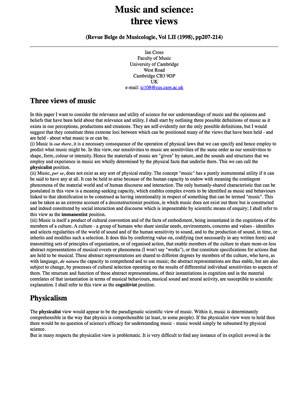 |
|
“The brain that plays music and is changed by it” “Playing a musical instrument demands extensive procedural and motor learning that results in plastic reorganization of the human brain. These plastic changes seem to include the rapid unmasking of existing connections and the establishment of new ones. Therefore, both functional and structural changes take place in the brain of instrumentalists as they learn to cope with the demands of their activity.” Professor Alvaro Pascual-Leone |
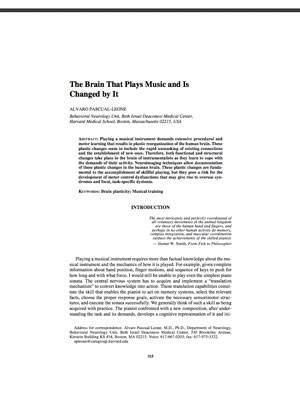 |
Make your Contribution
I’m sure you’ll agree this is only a little bit of the research available to us. Often the best information shared is by teachers who are finding new advocacy everyday- people just like you!! As a worldwide group of music teachers, we are able to be a collective of research and information. Imagine the wealth of knowledge and wisdom, we can all benefit from if we are all prepared to share just one advocacy item each.
Contribute by simply sharing your views :
“What is your single most interesting music education related fact or quote?”
Please leave your and comment and links in the box provided below, and we can continue to build up resources for the advocacy of music education.


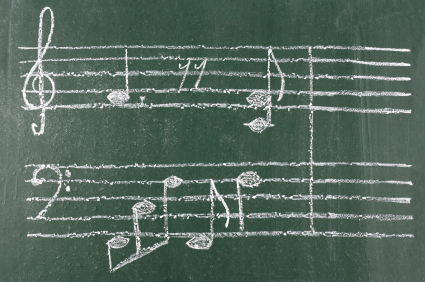
Practicing and playing music has always been a mode of reconnecting with my inner self. I love that this quote gives actual scientific proof of the healing effects of music.
here’s the entire quote:
“Classical music affects the brain’s organization and abilities, through its melody and rhythm. The rhythm raises the level of serotonin produced in your brain. Serotonin is a neurotransmitter, involved in the transmission of nerve impulses that helps maintaining joyous feelings. When the brain produces serotonin, tension is eased. In fact depression is a consequence of the scarce production of this hormone. Serotonin is released when the brain is “positively shocked”. For instance: if we look at a splendid painting, smell a delicious scent, feel an extraordinary sensation, eat something delicious or listen to some charming music, then the brain lets off a certain amount of serotonin which arouses and maximizes pleasant feelings. Music’s rhythm can also stimulate other natural cadences of the body, resembling the heartbeat, or the Alfa-rhythm of the brain, and this effect is used to counter the development of clinical depression. The melody instead, is the “sparkle” that catalyses the creative process in our minds.
The peculiarity of music is that while poetry and the literature must rely on the rational transport to inspire an emotion, since they are mediated from words, music omits this stage and points directly to stage of communicating emotions. Music does not pass through rationality to express its essence, it crosses right to our emotions.”
http://sissi.hubpages.com/hub/Effect-of-Classical-Music-on-the-Brain
Plato quote – Music is the most potent tool in education